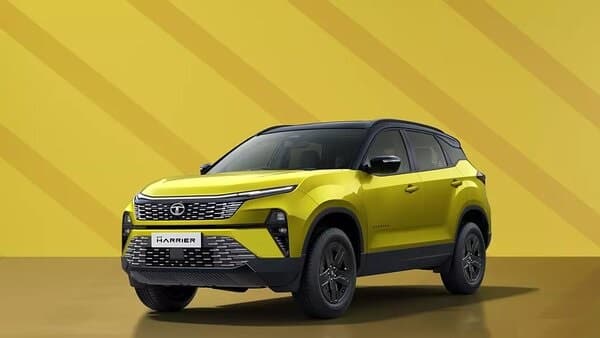Tata Harrier
Tata Harrier is a 5 Seater seater car, Ex-showroom price starting from Rs. 15,49,000 in India. It is available in 25 variants, 1956.0 cc engine available in and 2 transmission option: Manual,Automatic. Tata Harrier mileage is 14.6-16.8 kmpl.| Engine | 1956.0 cc |
| Mileage | 14.6-16.8 kmpl |
| Fuel Type | Diesel |
| Transmission | Both |
Tata Harrier price starts at ₹ 15.49 Lakhs and goes up to ₹ 26.44 Lakhs (Ex-showroom). Tata Harrier comes in 25 variants. Tata Harrier's top variant is Fearless Plus Dark Edition AT.
₹15.49 Lakhs* | 1956 cc Diesel Manual |
₹15.99 Lakhs* | 1956 cc Diesel Manual |
₹16.99 Lakhs* | 1956 cc Diesel Manual |
₹17.49 Lakhs* | 1956 cc Diesel Manual |
₹18.69 Lakhs* | 1956 cc Diesel Manual |
₹19.69 Lakhs* | 1956 cc Diesel Manual |
₹19.99 Lakhs* | 1956 cc Diesel Automatic |
₹19.99 Lakhs* | 1956 cc Diesel Manual |
₹20.19 Lakhs* | 1956 cc Diesel Manual |
₹21.09 Lakhs* | 1956 cc Diesel Automatic |
₹21.39 Lakhs* | 1956 cc Diesel Automatic |
₹21.69 Lakhs* | 1956 cc Diesel Manual |
₹21.69 Lakhs* | 1956 cc Diesel Manual |
₹22.24 Lakhs* | 1956 cc Diesel Manual |
₹22.99 Lakhs* | 1956 cc Diesel Manual |
₹23.09 Lakhs* | 1956 cc Diesel Automatic |
₹23.54 Lakhs* | 1956 cc Diesel Manual |
₹23.64 Lakhs* | 1956 cc Diesel Automatic |
₹24.09 Lakhs* | 1956 cc Diesel Automatic |
₹24.39 Lakhs* | 1956 cc Diesel Automatic |
₹24.49 Lakhs* | 1956 cc Diesel Manual |
₹24.94 Lakhs* | 1956 cc Diesel Automatic |
₹25.04 Lakhs* | 1956 cc Diesel Manual |
₹25.89 Lakhs* | 1956 cc Diesel Automatic |
₹26.44 Lakhs* | 1956 cc Diesel Automatic |
Tata Harrier Specifications and Features
| Airbags | Yes |
| Body Type | SUV |
| Mileage | 14.6 kmpl |
| Engine | 1956.0 cc |
| Sunroof | Yes |
| Fuel Type | Diesel |
Tata Harrier comparison with its competitors
| Model Name | Tata Harrier | Kia Seltos | Tata Safari | Hyundai Alcazar | MG Hector Plus | Hyundai Creta N Line |
|---|---|---|---|---|---|---|
| Price (Ex-Showroom) | ₹15.49 - 26.44 Lakhs | ₹10.9 - 20.3 Lakhs | ₹16.19 - 27.34 Lakhs | ₹16.77 - 21.28 Lakhs | ₹17 - 22.76 Lakhs | ₹16.82 - 20.45 Lakhs |
| Expert Ratings | 3.5 out of 5 | 4 out of 5 | 4 out of 5 | 3.5 out of 5 | 4 out of 5 | - |
| Engine | 1956 cc | 1482-1497 cc | 1956 cc | 1493-1999 cc | 1451-1956 cc | 1482 cc |
| Mileage | 14.6-16.8 kmpl | 17-20.7 kmpl | 14.5-16.3 kmpl | 18.1-20.4 kmpl | 12.3-15.6 kmpl | 18-18.2 kmpl |
| Fuel Type | Diesel | Petrol/Diesel | Diesel | Petrol/Diesel | Petrol/Diesel | Petrol |
| Airbags | Yes | Yes | Yes | Yes | Yes | Yes |
| Transmission | Manual/Automatic | Manual/Automatic | Manual/Automatic | Manual/Automatic | Manual/Automatic | Manual/Automatic |
My Garage
Popular Tata Cars
- Popular
- Upcoming
First launched in January of 2019 at a time when the mid-size SUV space was hardly as peppered with options as it is today, the Tata Harrier has found a special place in the Indian car market courtesy its capable diesel motor, relatively spacious cabin and robust build quality. But mostly, it was about the butch and muscular visual appeal of the Harrier, its absolutely untamed road presence. Over a lakh units of the Harrier SUV have been sold but Tata Motors is clearly hungry, and hungry for more. And so, it is now time for the facelift Harrier to make its presence felt against its every-growing list of SUV rivals.
The new Tata Harrier continues to be offered with the same and solitary diesel engine option. But while that is a square snub to an ever-increasing customer base that is preferring petrol motors for a plethora of reasons, the updated Harrier does still pack in quite a lot to continue making a solid case for itself. Here is a deeper dive into what to expect from the model:
Also watch: Tata Harrier facelift: First impressions
2023 Tata Harrier SUV: Time to Shred
The latest Harrier looks far sharper than it ever has, complete with new shade options including this polarising Sunlit Yellow hue. All points to Tata for going bold but this is a very well calculated risk considering that the Harrier is positioned to attract a young SUV-buying audience. Or at least younger than the customer base for sibling Safari.
| 2023 Tata Harrier: Body colour options |
| (Note: Colour options depend on variant selected) |
| Sunlit Yellow |
| Pebble Grey |
| Lunar White |
| Coral Red |
| Seaweed Green |
| Ash Grey |
| Oberon Black |
But go beyond the hues and there are even more highlights to take note of. The face, for one, is more angular now. The grille has been updated entirely and now comes with the same end-to-end connected DRL that was seen on the latest Nexon EV. On either side are sequential DRLs while the casing for the projector head lamp and fog lamp is now vertical and significantly sleeker.
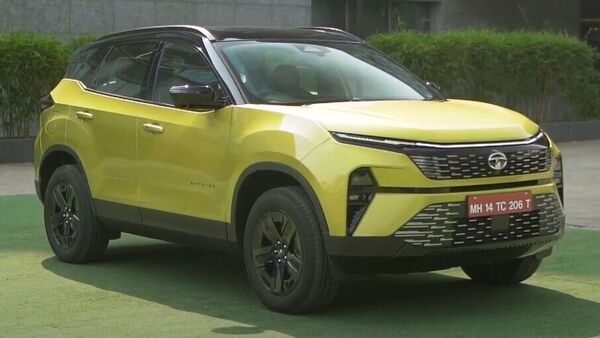
The side profile of the new Harrier showcases 18-inch alloy wheels - 19, if you opt for the Dark Edition of the model, and ‘Harrier’ lettering on the front two doors. Towards the rear, the connected LED tail lamp lends the SUV yet another modern visual appeal while the tail lights have been tweaked marginally too.
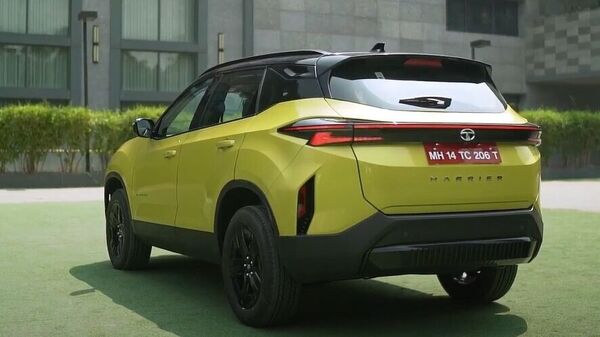
Overall, the Harrier assumes a far sportier appeal in its latest version but without losing its overall road presence which remains solid and dominant.
2023 Tata Harrier SUV: Packed from Within
The updated Harrier is obviously the same dimension as the version it replaces which means there is no change to how much space it offers for passengers. Cabin space, thankfully, has been a strong point for the vehicle even if the cargo area could have been bigger.
But beyond space itself, the new Harrier is noticeably more premium now than it has been thus far. The stretched dashboard, for instance, looks fresh because of the clever use of layering and colours. In fact, there are coloured elements on the center console that match with the exterior body colour in this particular review unit. The 12.3-inch main infotainment screen is fit enough to be plonked on vehicles in models several segments higher and the display is crisp and extremely responsive to touch. The quality of the feed coming in from the 360-degree camera is also far above par. There is support for Android Auto and Apple CarPlay, and the map feed can also be teleported to the 10.24-inch all-digital driver display.
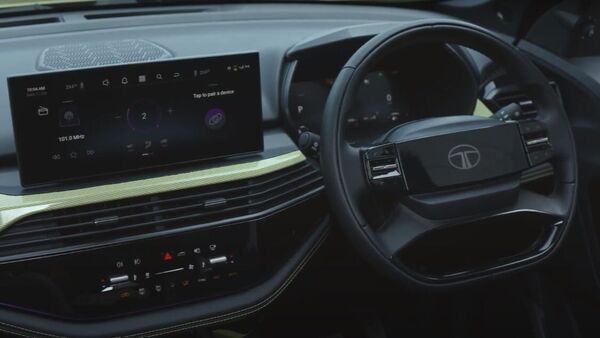
The four-spoke steering wheel is also new and on the lines of what was seen on the new Nexon model, complete with mounted controls and illuminated ‘Tata’ logo. The center console also looks more modern now but is likely to get scratched extensively over prolonged use period. We know because we inadvertently made a few marks.
The additional feature highlights include multiple point voice command support - Native Tata, Alexa and Google, to name a few. The panoramic sunroof is now voice activated, there is dual-zone climate control, powered front two seats, ventilated front seats, powered tailgate, front and rear parking sensors, 10-speaker JBL sound system with 13 JBL Sound Modes (essentially equalisers), cabin air purifier, mood lighting, Tyre Pressure Monitoring System (TPMS) and an updated ADAS (Advanced Driver Assistance Systems) too. There is also support for wireless phone charging while the number of charging ports are likely to outnumber the number of available devices in a packed car.
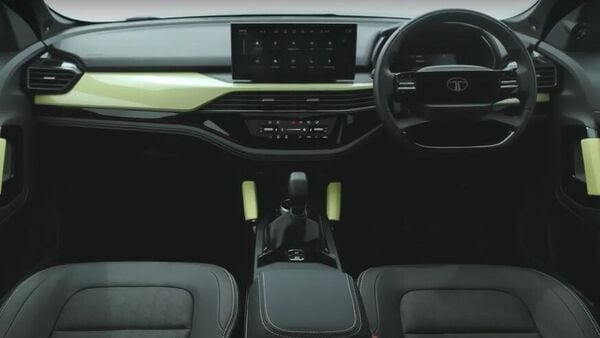
Here is an SUV now that is taking a very specific challenge to two very specific Korean rivals that are known to hit it out of the park when it comes to equipping comfort and convenience features in their respective offerings. There are some quality issues - we noticed loose hinges on the trunk door, but it is likely that Tata will address these in the customer units during eventual shipment.
2023 Tata Harrier SUV: On the Move
As mentioned previously, the Harrier continues to put all of its faith in the Kryotec 2.0-litre Diesel engine that is mated to a six-speed automatic gearbox or a six-speed manual stick. In our short drive experience, we found no real change to the drive dynamics with the acceleration responding well to the moves on the relatively slick manual gear shifts. There is 167 bhp and 350 Nm of torque for the taking and while there still is some roar from the motor when the throttle is pressed hard, this should actually appeal to the diesel darlings out there.
On the safety front, Harrier has already proved its worth in Global NCAP crash tests and now comes with six airbags as standard while there are seven airbags on the top end variant. There are also standard safety features that include ABS, Electronic Stability Program, three-point seatbelt for all passengers, etc. The updated ADAS list is great too but we didn't get to test these enough to form an informed opinion. We shall leave it for when we get the new Harrier for a longer period of time.
2023 Tata Harrier: Verdict
The updated Tata Harrier is the best Harrier. Period. But is it the best in its segment? Not having a petrol option is a massive miss for an SUV that otherwise covers all its bases fairly well. It commands respect but now not on the basis of its muscle but for its style. The feature list is exhaustive and the diesel motor is quite capable, complete with multiple terrain modes as well. Expect a decent bump up in pricing but even still, here is a confident five-seater SUV that should appeal to a wide set of buyers.




